
Empowering Community Colleges with the Low Cost Virtual Reality Project
Background
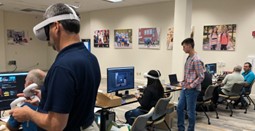 The Low Cost Virtual Reality project is a new innovative training that empowers teachers
to create their own low-cost virtual reality (LCVR) environments and content, without
the need for expensive equipment, software, or commercial VR subscription payments.
This program was successfully piloted at Somerset Community College (SCC) in spring
2022, where it was shown that even instructors with little to no experience in programming,
game design, or related fields can be trained to create engaging and effective VR
classroom environments in a short period of time all on their own. This increased
accessibility allows for a wider range of educators to take advantage of the benefits
of VR in their teaching and to provide students with more engaging and effective learning
experiences. This project is replicating, with VR technology, a successful program
model in additive manufacturing (AM) technology previously developed by SCC which
has resulted so far in over 150 educators trained in AM, 14 colleges adopting the
AM certificate program, and state-wide pathways including AM for high school students.
The program model utilizes an open cloud-based curriculum to ensure uniformity in
content, easy delivery, LMS compatibility, and allows for rapid updating of the training
content.
The Low Cost Virtual Reality project is a new innovative training that empowers teachers
to create their own low-cost virtual reality (LCVR) environments and content, without
the need for expensive equipment, software, or commercial VR subscription payments.
This program was successfully piloted at Somerset Community College (SCC) in spring
2022, where it was shown that even instructors with little to no experience in programming,
game design, or related fields can be trained to create engaging and effective VR
classroom environments in a short period of time all on their own. This increased
accessibility allows for a wider range of educators to take advantage of the benefits
of VR in their teaching and to provide students with more engaging and effective learning
experiences. This project is replicating, with VR technology, a successful program
model in additive manufacturing (AM) technology previously developed by SCC which
has resulted so far in over 150 educators trained in AM, 14 colleges adopting the
AM certificate program, and state-wide pathways including AM for high school students.
The program model utilizes an open cloud-based curriculum to ensure uniformity in
content, easy delivery, LMS compatibility, and allows for rapid updating of the training
content.
Objectives
- Empower teachers to create their own VR environments and content
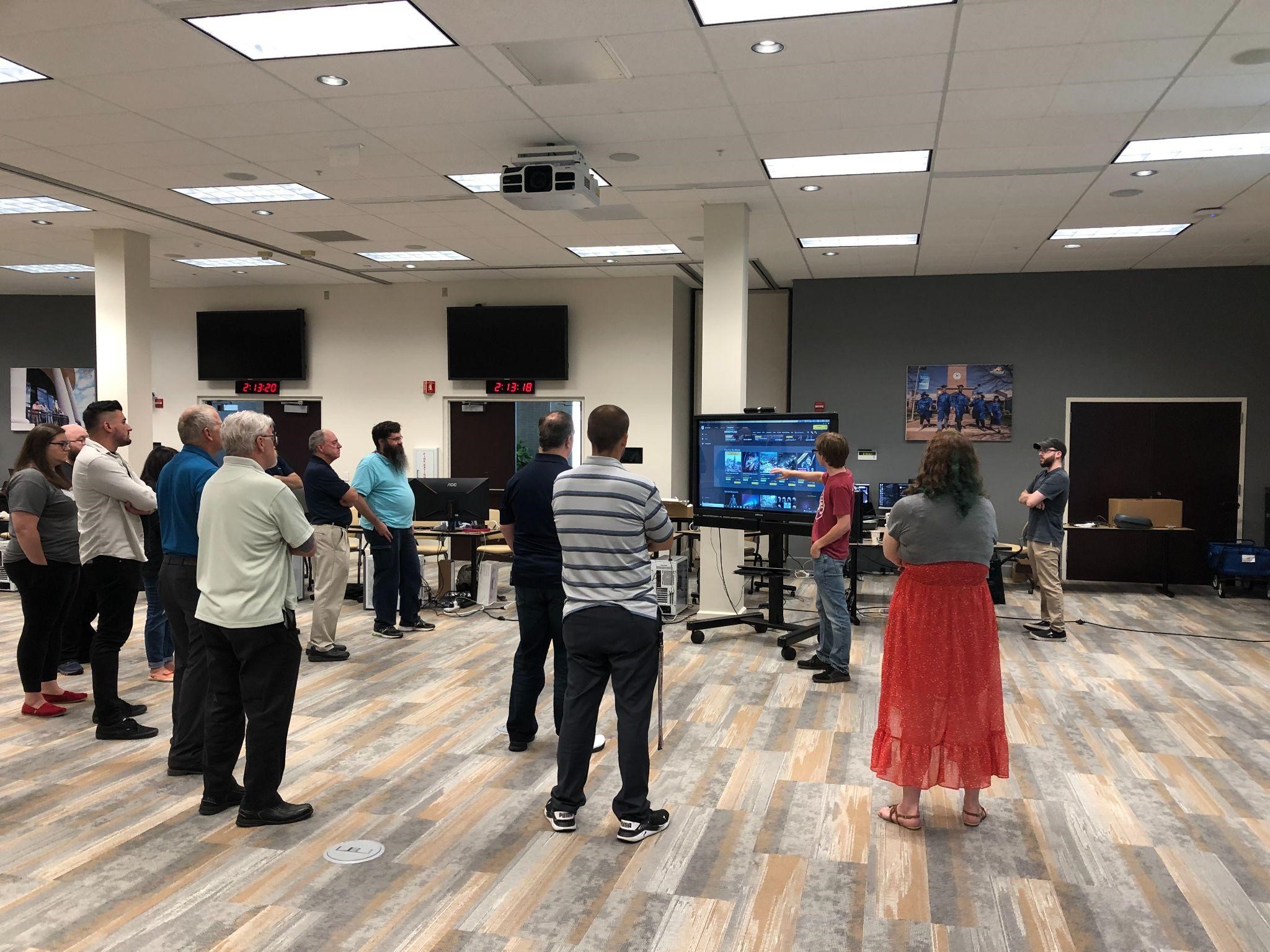 Establish an open-source cloud platform to organize, manage, and freely share LCVR
modules
Establish an open-source cloud platform to organize, manage, and freely share LCVR
modules- Provide cost-effective and accessible training for educators
- Integrate VR technology into existing curriculum
- Provide teachers with limitless virtual teaching aids and concept reinforcing materials
- Improve students' learning experiences and conceptual retention
- Bridge the gap in workforce development
- Solve the workforce shortage by preparing skilled student technicians for futures in multiple industries
- Incorporate VR technology into existing career and technology, science, and engineering educational programs
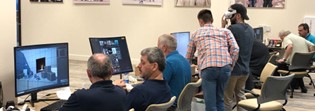 Foster partnerships between industry, community colleges, and universities
Foster partnerships between industry, community colleges, and universities- Raise awareness of the potential of VR training for STEM fields to students who play video games and have interest in the technology
- Lay the groundwork for the creation of VR versions of highly expensive, sensitive, or dangerous equipment, such as robotics, clean rooms, semiconductor fabrication machines, acetylene torches, etc. so that educators are no longer limited by budgets or available lab time when it comes to technician training.
Pilot Program Success
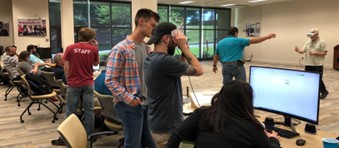 The pilot program of the Virtual Reality Access Center project at Somerset Community
College was a resounding success. In the program, fifteen faculty and staff members
from eight colleges within the Kentucky Community and Technical College System participated.
Twelve completed the training, created their own virtual reality classroom environments,
and learned the basics of building interactive student lab experiences.
The pilot program of the Virtual Reality Access Center project at Somerset Community
College was a resounding success. In the program, fifteen faculty and staff members
from eight colleges within the Kentucky Community and Technical College System participated.
Twelve completed the training, created their own virtual reality classroom environments,
and learned the basics of building interactive student lab experiences.
How can your college or school participate?
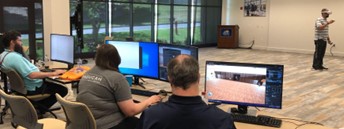 Implementing the program at a new institution is a straightforward process. The first
step is to recruit local team members at your school to be the pioneers. This pioneering
team will go through the remote VR training provided by SCC and receive a LCVR headset
with some minor accessories as part of the training. The team will then begin to create
their own LCVR modules relevant to their own areas of interest and also to demonstrate
to other local faculty, staff, and administrators. The team will serve as champions
to inform others about the VR training program and also work to enhance the existing
curriculum by integrating LCVR modules, especially curriculum that is conceptually
difficult or expensive to deliver. Over time, and with guidance from SCC, the local
team will begin to integrate the same training materials into student courses to generate
VR literacy and create more LCVR content. Ultimately, using the SCC scaling process,
materials, and open cloud platform, to create a short credit hour VR certificate program
that can be locally integrated into numerous existing programs and pathways as a value-added
certificate.
Implementing the program at a new institution is a straightforward process. The first
step is to recruit local team members at your school to be the pioneers. This pioneering
team will go through the remote VR training provided by SCC and receive a LCVR headset
with some minor accessories as part of the training. The team will then begin to create
their own LCVR modules relevant to their own areas of interest and also to demonstrate
to other local faculty, staff, and administrators. The team will serve as champions
to inform others about the VR training program and also work to enhance the existing
curriculum by integrating LCVR modules, especially curriculum that is conceptually
difficult or expensive to deliver. Over time, and with guidance from SCC, the local
team will begin to integrate the same training materials into student courses to generate
VR literacy and create more LCVR content. Ultimately, using the SCC scaling process,
materials, and open cloud platform, to create a short credit hour VR certificate program
that can be locally integrated into numerous existing programs and pathways as a value-added
certificate.
Available resources and support for participating schools include access to the training materials developed during the pilot program, as well as ongoing support from the team at Somerset Community College. Participating schools will also have unlimited access to all the collaborator developed LCVR modules through SCC’s LCVR database for direct download to their headsets, the opportunity to collaborate with other participating schools, and to share their own experiences and best practices.
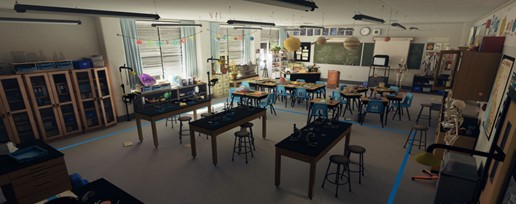
Typical Project Questions
Suggestions on Recruiting
This project is open to all that are interested, however, commitment time is a factor, therefore aside from full time faculty, SCC recommends the following for potential LCVR recruits:
- Library and Learning Resource Center staff
- Instructional Development staff
- Teacher’s Aides
- Students/interns that are in faculty supporting roles
- Administrators that oversee curriculum development
- Technical Education faculty that are also involved with custom workforce training
Free Vr Sample experience
To give participants a feel for what the training will be like and how easy it is to make your own VR content, SCC has provided a sampler experience to test-drive the training and to make sure your computer equipment is compatible with the software and that there are no I.T. issues. The lesson is designed to provide an easy to follow and enjoyable experience as you create your first VR module. The team’s only request is that once finished, users complete the assignment and fill out the questionnaire at the end.
